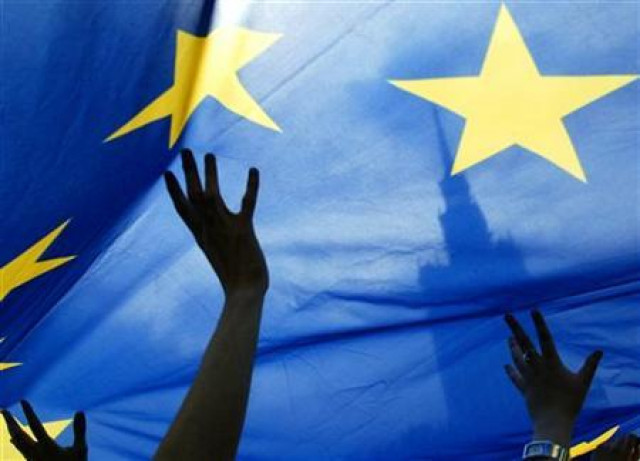EU lauds Pakistan’s struggle against terror
Ambassador Cautain says union now taking leading role in strengthening of international security

PHOTO: REUTERS
EU Ambassador Jean-Francois Cautain said this acknowledging the efforts made by Pakistan and its sacrifices to combat terrorism at a lecture on EU-Pakistan Relations: Challenges and Opportunities organised by Islamabad Policy Research Institute (IPRI) on Wednesday.
He acknowledged that Pakistan has suffered from extremism more than any other country, and stressed that Pakistan and the EU need to work together to combat terrorism, both within and outside their borders for global peace and security.
'PTI has approached EU, Britain, Gulf states to bring back looted wealth'
The EU ambassador pointed out that the EU is not just a trade organisation or large development agency, as it is now significantly engaged in the area of security and defence as well. “Since 2003, the Common Security and Defence Policy has enabled the EU to take a leading role in peace-keeping operations, conflict prevention and in the strengthening of international security,” Cautain shared during the first of the Ambassador Lecture Series.
He explained that over the past two years, the EU member states have been focusing on defence and security since the EU’s model of economic integration is also a unique opportunity to support engagement in the field of defence and develop collective defence capabilities.
Outlining some of the key points of the 2016 ‘Global Strategy for the European Union’s Foreign and Security Policy’, Ambassador Cautain said: “The EU is also working to strengthen the resilience of states within and outside its borders by supporting good governance and accountable institutions.”
Strengthening the internal and external nexus requires addressing issues such as counterterrorism, countering violent extremism, climate change and cyber security collectively, he stressed.
Bilateral trade
The ambassador lauded Pakistan’s efforts in terms of trade enhancement after the GSP Plus facility, and outlined that this was a win-win partnership. “Over the past 18 months, we have been working to finalise a new engagement plan to further deepen relations between Pakistan and Europe, and hope that a new agreement will be signed under the new government after Pakistan’s general elections.”
He said that while EU member countries want to invest in ventures like CPEC, “greater clarity and more information about CPEC’s long-term vision is required for this to happen.” It is also vital to recognise that connectivity is not possible without regional stability, he said.
Education and social sector
Cautain discussed EU’s development cooperation in education, rural development and governance and said that the EU has decided to substantially increase the development cooperation funds allocated to Pakistan to 635 million euros which was double when compared with the previous years. He explained that one-third of this fund goes to the education sector channelled through the government conditional upon the achievement of targets set by the government itself. Education is a big challenge for Pakistan, especially in Sindh, since enrolment rates over the past 10 years have only increased by one per cent’, he remarked.
WHO concerned over ‘low-performance’ of Pindi UCs
IPRI’s President Ambassador (retd) Abdul Basit said that the EU relationship with Pakistan was very important, not only politically but also economically.
“Under the 2012 Five-Year Engagement Plan, this relationship has moved from strength-to-strength, with GSP Plus incentives helping Pakistan build its capacity in order to become a more effective and competitive partner in international commerce,” he said.
In the question-answer session, Ambassador Cautain answered questions regarding Europe’s migration policy, nuclear energy production and Turkey’s pending EU membership, as well as EU’s relationship with Russia and the EU position on Ukraine.
There were also questions about the Jammu and Kashmir dispute, especially about what the EU could do to help resolve the conflict.
Published in The Express Tribune, August 5th, 2018.











1724319076-0/Untitled-design-(5)1724319076-0-208x130.webp)






COMMENTS
Comments are moderated and generally will be posted if they are on-topic and not abusive.
For more information, please see our Comments FAQ